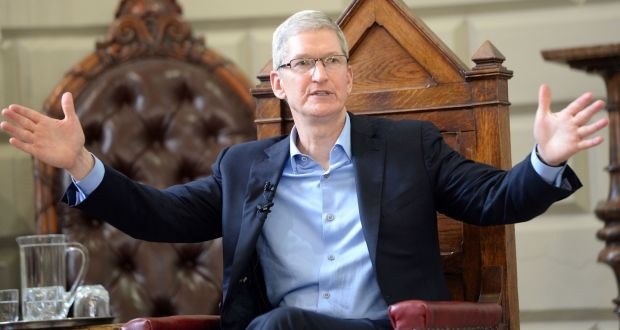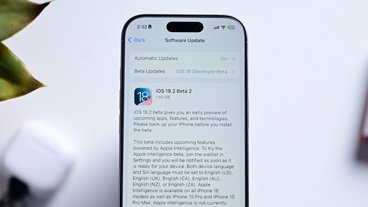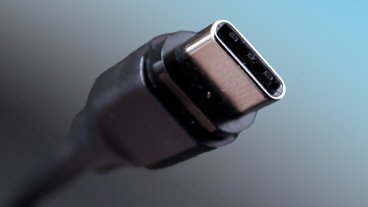Most U.S. officials are lining up to fight the $14.5 billion E.U. tax edict with support from assorted talking heads, but the battle appears to be more about which taxation agency the money belongs to, rather than actual support for Apple.
There has been no shortage of commentary about the $14.5 billion European Commission tax investigation ruling. Apple has weighed in, and so has Ireland, with both opposing the European Union's meddling in a business arrangement that has existed since 1980.
Since Tuesday's determination, Washington D.C. is gearing up for battle about the matter. Most are in support of Apple's cause, but not necessarily for Apple's reasons.
The U.S. Treasure Secretary is expecting "large and punitive retroactive recoveries" as a result of the ruling.
Strange bedfellows
Shortly after word of the ruling came down, Republican Speaker of the House Paul Ryan spoke out against the retroactive bill. He was joined by prominent Democrat leader Senator Chuck Schumer (D-N.Y.).
"The European Union is going to grab this money, instead of the U.S.," Schumer said. "It's a big signpost here for us."
Schumer also said that he and Ryan had begun discussions about corporate tax overhaul.
"This decision is awful," Ryan said in a statement about the ruling. "Slamming a company with a giant tax bill — years after the fact — sends exactly the wrong message to job creators on both sides of the Atlantic."
Dissenting voices
Not all U.S. governmental officials are on Apple's side, however. Democrat Carl Levin has led the charge against Apple's international tax strategies for many years, and blames the Internal Revenue Service as well.
"Royalties Apple collects for its overseas sales of products designed and developed in the U.S. should be taxed in the U.S.," said Levin, reiterating his long-held position on the matter. "But Apple has avoided the billions of dollars of taxes it owes the U.S. by transferring its intellectual property to itself in Ireland."
Levin added that "it is understandable that Europe would try to go after them."
Inside the D.C. Beltway, outside the government
Responses have also started emerging from lobbyist groups and Washington D.C. watchdogs about the ruling, which is already the largest of its kind, before interest is accrued. Comments are as expected, with little alteration from party lines about the matter, but groups watching for fraud and abuse are particularly riled up about Apple's earnings
"It's remarkable to think that the administration has been flying over to Brussels on taxpayers' dollars to lobby the European Union against collecting taxes owed in Europe when they're not collecting the taxes owed here," said the bipartisan Financial Accountability and Corporate Transparency Coalition's (FACT) Deputy Director Clark Gascoigne. "It's terribly ironic."
Educators and scholars are picking sides as well. While the government is seeking cash repatriation easements to draw large pools of cash back into the U.S., the matter is not so cut-and-dried economically.
"This is not taking 13 billion euros out of the U.S. Treasury's pocket and U.S. taxpayers' pocket and putting it into Europe," University of Washington School of Law lecturer Jeffery Kadet told the New York Times. "They wouldn't be bringing this money back to the U.S. anyway."
Apple will use its overseas cash reserves to fund repayments on its bond sales. The bond sales in turn give the company money to buy back its own stock.
Taxation with representation
U.S. Treasury Secretary Jack Lew commissioned a report in April about the issue, before meeting with the head of the European Commission Margrethe Vestager. The Treasury report said that a large ruling against Apple would create an environment where regulatory agencies and governments in the E.U. would pursue "large and punitive retroactive recoveries from both U.S. and E.U. companies."
Following the study, Congressional officials urged Lew to double taxes on E.U. companies in the US as a retaliatory move to the array of investigations underway against U.S. helmed international companies.
Lew believes that whoever ends up as the next U.S. President will spearhead corporate tax reform, which would make it more palatable for international companies to repatriate income to the U.S. The treasury secretary is expecting movement on the issue early in the next administration, given that it was a cornerstone of one failed presidential candidate, and a frequent speaking point for the remaining ones.
The European Commission's investigation on Apple's tax arrangement with Ireland concluded on Tuesday, with the comission demanding Apple pay 13 billion euro ($14.5 billion) to Ireland in back taxes, which could swell to over $21 billion if the appeal process fails. A FAQ lays out Apple's path to an appeal, and notes that the process will take several years to wrap up.
Irish governmental officials have commenced discussions on how to fight the ruling.
 Mike Wuerthele
Mike Wuerthele















 Oliver Haslam
Oliver Haslam
 Christine McKee
Christine McKee
 Malcolm Owen
Malcolm Owen
 William Gallagher
William Gallagher


 Amber Neely
Amber Neely
 Andrew O'Hara
Andrew O'Hara









21 Comments
"This is not taking 13 billion euros out of the U.S. Treasury's pocket and U.S. taxpayers' pocket and putting it into Europe," University of Washington School of Law lecturer Jeffery Kadet told the New York Times. "They wouldn't be bringing this money back to the U.S. anyway." Jeffery Kadet doesn't know what he is talking about. They don't have to bring the money home to impact the US. U.S. Treasury Secretary Jack Lew said that that if Apple pays this tax money to Ireland, Apple gets to deduct it as taxes paid to reduce their tax bill to the US. So that money is directly reducing the taxes paid in the US. This is exactly why the US is fighting this. If Apple brings the money home or not is moot. Bringing it home and paying taxes to the US has the same effect on taxes due in Ireland. So if Apple gets to bring it home at a 10% rate, and the ruling stands in the EU then they would only own a rate of 2.5% to Ireland. I actually see that as a win win win. Ireland gets some additional tax revenue to appease the voters who think Ireland should take the windfall being sought by the EU, the US gets 10% of the funds to our coffers, and Apple gets to bring home a good chunk of that overseas cash at a reasonable rate. Heck even the EU gets some benefit of a partial win if Ireland gets 2.5% more than they have gotten to date. Of course this all hinges on the US fixing the repatriation tax amount.
The problem is a lack of standardized laws without loopholes. Assessing a large tax bill years later is wrong. Assuming a company is not going to avoid taxes if at all possible is wrong. A company, like a person, will avoid taxes as best it can. Tim is right to stand up for this. I can see how people would be angered with Tim, but I am not and I think that anger is misplaced. BOTH sides of the Atlantic (and world) need to work on clear and fair taxation so companies can operate efficiently; where the largest profits go to the best products and services, not the best accountants and lobbyists. I think this message is probably lost in all the discussion. Too much money is tied up in it all.